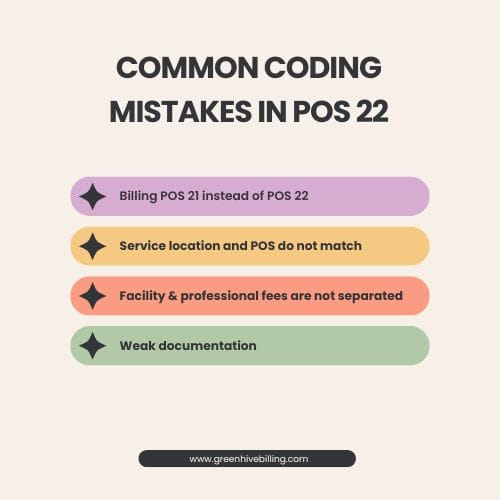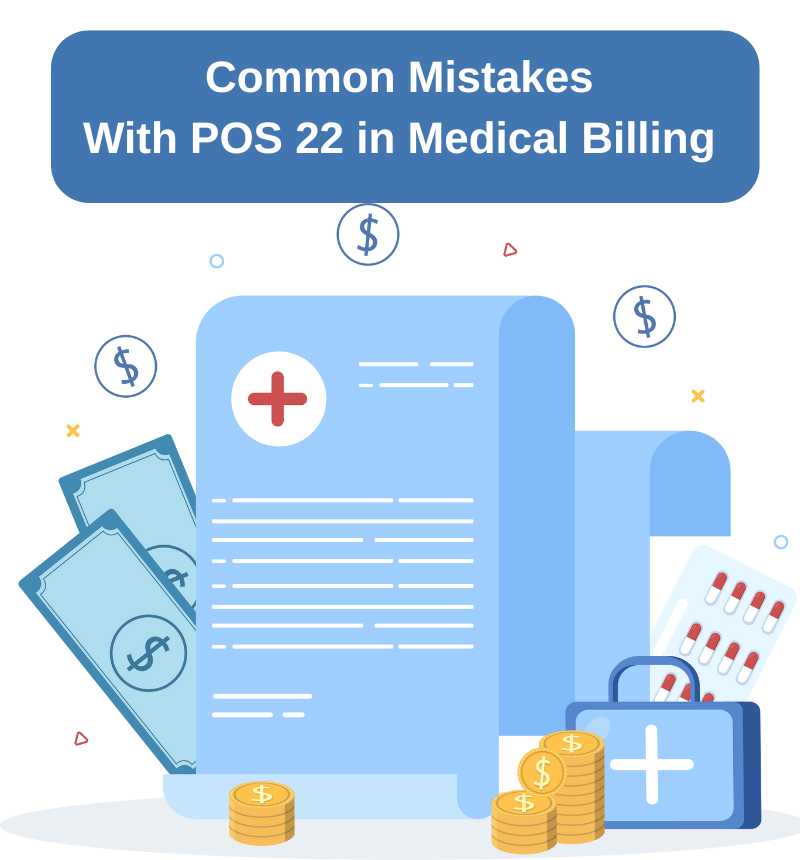Place of Service (POS) Code 22 is used to bill services performed in a hospital outpatient department. It sounds simple, but it’s often applied incorrectly. This results in denials, underpayments, or requests for repayment after the claim is processed.
If you manage your billing in-house, you may not even realize how much revenue is being lost to this single code error. And once the issues show up, they are costly to fix.
Frequent Coding Mistakes Involving POS 22
1. Billing POS 21 instead of POS 22 Medical Billing
It happens often. A provider bills POS 21 for a service that was performed in a hospital; however, it was specifically done in an outpatient department, and the patient was not admitted. POS 22 was the correct code. The claim gets paid at the higher non-facility rate, resulting in a future takeback or audit when the payer identifies the issue.
2. Service location and POS do not match
Some claims use POS 22 for a service that occurred in a private office or ASC. That mismatch is easy for payers to detect and often leads to denials or compliance red flags. The provider may not realize anything is wrong until the payment never shows up.
3. Facility and professional fees are not separated
In outpatient hospital settings, the facility and the professional components are billed separately. When both are bundled into one claim or billed twice, payers flag the claim. It either gets rejected or adjusted down, and now you are dealing with delays.
4. Weak documentation
Sometimes the Place of Service code is correct, but the documentation does not support it. If the claim and notes do not clearly state the hospital’s outpatient location, payers can still deny the claim. Vague location details or templated notes are a common reason for claim holds.
Best Practices for Accurate POS 22 In Medical Billing and Coding
Avoiding errors with POS 22 starts with your internal systems. Here are a few basic safeguards that help:
- Train staff to double-check the location for each encounter
- Map each site to the correct POS code in your billing software
- Do not bill facility and professional fees on the same claim
- Include clear documentation that shows where the service took place
- Run periodic audits focused on POS usage and code patterns
Even with checks in place, errors can slip through. This is especially true if your team is short-staffed or juggling too much at once. That is where working with an experienced billing partner can help.

Why Outsourcing Medical Billing Solves the Problem of POS 22 Error
If you are running a clinic, group practice, or specialty care center, billing errors are not just a back-office issue. They slow down reimbursements, frustrate staff, and put long-term revenue at risk.
A medical billing outsourcing company brings experience from teams that handle a wide range of issues daily. This means POS errors are flagged and corrected before claims are submitted.
Focused expertise
Billing teams working with different care settings know when to use POS 22 and when not to. They stay updated with payer rules and CMS guidance. Their workflow includes payer-specific edits and claim reviews that catch errors early.
Built-in quality control
Claims pass through multiple checkpoints before submission. If the documentation does not support the POS used, it gets flagged. This prevents denials before they happen.
Better cash flow
When claims are coded and submitted properly the first time, payments come faster. You avoid rework, delays, or write-offs caused by POS mistakes.
Less staff stress
Your team no longer has to worry about code errors or fixing denied claims. That gives them time to focus on patients and day-to-day operations.
Wrapping Up
POS 22 is just one code. But it is a code that can quietly eat into your revenue if it is used the wrong way. Whether it is a single mistake or a recurring issue, the impact is real. A clear understanding of how and when to use POS 22 helps prevent denials, supports clean claim submission, and reduces the risk of compliance issues or repayment requests.
* Source: https://www.cms.gov/

